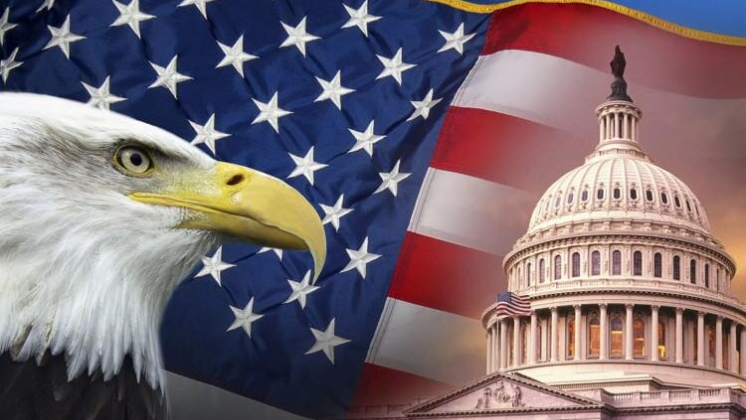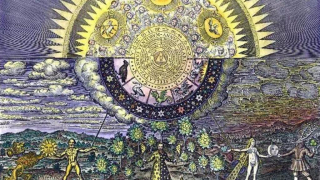‘I Believe in America’: The False Religion of Americanism
Mr Joe Haines recently wrote an excellent essay for the Abbeville Institute detailing President Lincoln’s destruction of the voluntary union of free States and his creation of a new, indissoluble, and unitary nation from the wreckage.
It is a well-constructed essay in its historical and political aspects, and yet there is one aspect that we felt was underdeveloped – the religious. Mr Haines set the table with some provocative dishes at the outset of his essay:
‘I am not a “Lincoln Scholar.” And I will fight any man who accuses me of being one. Not that being a Lincoln Scholar isn’t good business. Thanks to these folks, who recycle the Lincoln myths like a perpetual motion machine, Lincoln is surpassed by only Jesus Christ in our national pantheon of deities.
‘Challenging the Lincoln myth is viewed as unpatriotic at best and heretical by those who make a living praising his name. The irrational behavior by Lincoln Scholars was commented upon as far back as 1931 by writer H.L. Mencken, who wrote;
‘“Lincoln has become one of our national deities and a realistic examination of him is no longer possible.”’
But he took them away after that; the rest of the piece veers away from any examination of those religious themes, leaving the reader’s mind quite famished. That is unfortunate, for the religious dimension is vital to understanding the longevity of the new American union that Lincoln established, which, at first sight, would seem too large and diverse to be held together for very long.
The author David Gelernter is helpful in this regard. His book, Americanism: The Fourth Great Western Religion, explores the religious dimension that Mr Baines does not.
There are some things to note at the outset. The dishonesty of the Lincoln cult is rather notorious, and Mr Gelernter is no exception to the rule. His book contains notable distortions, such as his labeling of the colony of Virginia as a ‘settlement’ with ‘a Puritan flavor’ (Americanism, Doubleday, New York, 2007, p. 51) – transforming the staunchly un-Puritan Cavalier settlers of Virginia into the opposite is quite a feat of historical alchemy; his ascribing the first representative body in North America to the ‘Puritan colony’ of Virginia (p. 72); and his claim that aristocratic, Cavalier Maryland ‘soon had a Puritan majority’ after her establishment (p. 53), which is as non-sensical as his oxymoronic pairing of Puritan Virginia.
That is shameful, but it gives the reader an idea of the darkness he is confronting with Lincoln and Americanism.
And into that darkness we now step.
Mr Gelernter is quite open about his belief: America is a new world religion with its own particular creed. It grew out of a dying Puritanism, and its central religious figure is none other than Abraham Lincoln.
He provides some of the central tenets of this new religion early on: ‘No religion had ever before laid out these three political ideals as its creed: Liberty. Equality. Democracy. The great achievement of Americanism is to proclaim these three principles and their biblical origins, to proclaim them in America’s own new scriptures—especially Lincoln’s presidential speeches—and to make them real in a functioning nation. But Americanism goes further, to declare that these principles are not the exclusive property of Americans or Christians or believers in God or descendants of white Europeans. According to the American Religion, they belong to all mankind, and Americans have a duty not merely to preach but to bring them to all mankind’ (pgs. 3-4).
It is noteworthy that the three elements of the American Creed are contradictory. Liberty tends to be stifled by a focus on equality and democracy (the latter two tend to promote a stifling uniformity).
Furthermore, the odor of heresy and blasphemy is quite strong. Asking Jews and Christians who have received revelations from God Himself to accept a new religion fashioned entirely by men is audacious and foolhardy, to say the least. But Mr Gelernter is not bothered by this at all, gently chiding them for their concerns instead: ‘Christians and Jews ought not to see Americanism as a blasphemous replacement for Christianity or Judaism. . . . The American Religion is traditional religion’s response to modern political reality. It is an extension to the structure of Judaism or Christianity, an extra room out back’ (p. 11).
It would seem to be a bit more than that. If one can be an adherent of Americanism without believing in God at all (per his statement further above), then this new religion is nothing at all like traditional Judaism and Christianity.
The duty to institute the contradictory American Creed in countries all over the world (and not simply to preach it to them) Mr Gelernter calls ‘democratic chivalry’. From whence comes this duty? From America’s chosenness: ‘They were a new chosen people in a new promised land, blessed far beyond their deserts. They were grateful to God and indebted to God. They owed Him. Americans took up chivalry to pay a debt to the Lord—and to reassure themselves that they too deserved their blessings on account of good behavior’ (p. 36).
Notice the uniquely Puritan psychology at work here: Americans must be constantly intervening in other countries’ affairs to assure themselves that they remain in God’s good favor; they are always anxious to never appear un-chosen. They are thus unable and unwilling to obey the Apostle Paul’s commandment to ‘lead a tranquil and quiet life’ (I Timothy 2:2).
The spiritual delusion at work in Americanism is so strong that actual Christian commands like St Paul’s are ignored while fatuous assertions like the following are accepted without question: ‘Americans started lecturing the world on right and wrong long before the United States was born. (That’s one reason the world loves us so much.) . . . willingness to butt in on the side of right is what America is all about’ (pgs. 35, 68). We would be awfully curious to see what an actual poll of people in countries where the Yankee American Empire has ‘butt[ed] in on the side of right’ – Afghanistan, Iraq, Libya, Syria, Yemen, just to name a few – think of those so-called chivalric interventions.
But none of this fabulous work at home or abroad would have been possible without the singular figure of Abraham Lincoln. Mr Gelernter says plainly, ‘Lincoln and the Civil War completed the American Religion. It was Alexander Stephens, vice president of the Confederacy, who said that “with Lincoln the Union rose to the sublimity of religious mysticism [better said, perhaps, that it fell deep into the black pit of idolatry—W.G.]”’ (p. 103).
He continues, ‘Lincoln shows us a remarkable process, the transformation of one religion into another; Lincoln completed the transformation of Puritanism into Americanism. When it was complete Americanism was Puritanism, in a new form’ (Ibid.).
This is disconcerting when contrasted with a statement Mr Gelernter makes earlier in his book, wherein he describes the decline of Puritanism: ‘Many Puritan churches . . . eventually abandoned Puritanism for Unitarianism. . . . When the bright blaze of Puritanism was replaced by the pale flicker of Unitarianism, a spiritual vacuum appeared on the American landscape. Eventually it was filled by Americanism itself. The American Religion was the true heir of Puritanism’ (p. 56).
Given that Puritanism lacked some essential elements that caused it to die, why does Mr Gelernter praise it so thoroughly throughout his book? If its defects were such that it decayed into coldly rational Unitarianism, why praise it as the main root of Americanism? If the mighty Puritan religion, the mother of Americanism, eventually saw its end, what hope do adherents of Americanism have that their religion will stand the test time? These and similar questions are simply not raised in Americanism, but the answers they beg do not bode well for the worshippers of America.
Nevertheless, Abe Lincoln, uncomfortable with Christianity, embodied the transformation of religions with which Mr Gelernter is so enamored: ‘Lincoln seemed to transfer his allegiance over his lifetime—we can practically see it happening—from Puritan Christianity to the biblical religion of Americanism’ (pgs. 103-4). He sees this transformation particularly in Lincoln’s Second Inaugural Address: ‘Lincoln takes the central ideas of Judeo-Christianity—sanctity and sin and faith, divine commandments and favor and punishment, mercy and charity and forgiveness—lifts each symbolically before the world, and consecrates each one to the new faith. This speech is the incandescent core of the American Religion’ (p. 104).
Mr Gelernter credits Lincoln with supplying the Sacred Scriptures for Americanism: ‘In the Gettysburg Address and the Second Inaugural, Lincoln produced the two greatest sacred narratives in the English language (outside of the English Bible itself); each is a guide to the Civil War and its meaning and to America’s Religion, history, and experience as Lincoln understood them. The Gettysburg Address is the best statement we have of the American Creed. In the Second Inaugural, Lincoln delivered a Puritan message in the language of Americanism. The speech marked the transformation of Puritanism into the new American Religion’ (p. 106).
This, despite clear warnings in the Holy Scriptures against adding to or subtracting from them (e.g., Deuteronomy 4:2, Revelation 22:18-19).
Speaking again of the Second Inaugural, he declares that ‘ . . . the war and this great occasion created the mold, and Lincoln’s speech filled it with the molten bronze of a new religion. . . . Lincoln’s Second Inaugural is the exact center of American spiritual history. He could have delivered this address in church but chose not to; he could have delivered it to believing Christians only but did not. By speaking these words from the steps of the Capitol on democracy’s most sacred occasion, he didn’t Christianize America—he Americanized Christianity. He put Judeo-Christianity’s holiest beliefs at America’s disposal. He mixed them into the very concrete of which Americanism is made’ (pgs. 138, 139).
This, despite clear warnings in the Holy Scriptures against changing the Gospel of the Lord Jesus Christ (Galatians 1:6-9, Jude 3).
And Lincoln universalized the American Creed, made it a duty to spread it all over the world: ‘On his way to Washington to assume the presidency, Lincoln had declared that America from its founding “held out a great promise to all the people of the world for all time to come.” . . . The Declaration “gave promise that in due time the weights should be lifted from the shoulders of all men, and that all should have an equal chance.” America had a mission to all mankind. Democratic chivalry was every American’s duty’ (pgs. 141-2).
Due to this missionary imperative, chaos and destruction have been sown across the globe by the Savior Nation, an image disturbingly similar to the nightmarish, devouring beast seen by the Holy Prophet Daniel in a vision (Daniel 7:7, 19).
Mr Gelernter sums up his thoughts about Lincoln: ‘And what should we say about Lincoln in the end?
‘He poured his whole passion for God and the Bible into Americanism. He proclaimed Americanism a world religion.
‘His extraordinary personality made Americanism live. His martyrdom made it holy’ (p. 145).
The remaining chapters discuss how Lincoln’s new American Religion was instituted worldwide by true believers like Presidents Woodrow Wilson and George W. Bush, who used the US military to spread the American Creed to countries all over the world.
The opponents of Lincoln’s re-creation of America are accustomed to using legal, political, or economic arguments to show how improper that action was, to try to undo it, etc. But that will never be enough. Mr Gelernter’s book shows that there is a deep religious element to Americanism. Commentators more recently than him reveal this, too – symbolist Jonathan Pageau being one of them. Back in July, in his review of the new Superman movie, he described how the zeal of the converts to Americanism (e.g., new immigrants excited to live the American Dream of rootless hypermaterialism) keep that religious project going, similar to the way converts to Christianity strengthen the Church.
This spiritual element must be taken into account and taken seriously. We understand how difficult that is for some. Americanism is such a tremendously dumbfounding mountain of errors. It is laughable to consider the scale of its falsehoods and distortions. Yet its grip on the souls of millions of people across all the States (including, sadly, the States of Dixie) shows that its religious power is real. It is more or less what is preached every day on ‘conservative’ talk radio, and even more disturbingly what is celebrated in many so-called churches.
This battle against the Lincolnian system, it cannot be fought merely on the earthly plane with intellectual weapons. It must also be fought on the spiritual plane with spiritual weapons.
Throughout Church history, heretics and heresies have been anathematized. On the first Sunday of Lent, Orthodox Christians hear a long list of people and teachings read from a document called the Synodikon that have been anathematized by the Universal Councils of the Church, to each one of which all those present in the churches respond with a ringing ‘Anathema!’
It is that kind of mindset that will be needed to win the war against the false religion of Americanism that has bound so many generations of people in its demonic grasp. Americanism must be openly declared Anathema by the uncorrupted churches in all fifty of the States, as a thing accursed, as a thing opposed to the Gospel of the Lord Jesus Christ, as a hell-born distortion of it. We must start untangling the theological mess begun by the Puritans and made all the worse by latecomers like Lincoln, Wilson, Truman, Reagan, etc., who confused ‘America’ with the Church of the Holy Trinity. A priest named Father John from Arkansas said it well:
‘And honestly, if we hold out hope for the salvation of the world, we must have the courage to say “Anathema!” to every false teaching. For in a way that the world will never understand, the Church’s “Anathema!” to every perversion of the Gospel is, at the same time, Her confession of Christ, the salvation of the world.’
Through that action, and through prayer and fasting, hymn-singing and almsgiving, repentance and prostrations, and through other Christian spiritual endeavors, while not neglecting good historical and legal research, may the 0nly Good and Merciful Lord grant all the States and all the world freedom from the false religion of Americanism.













